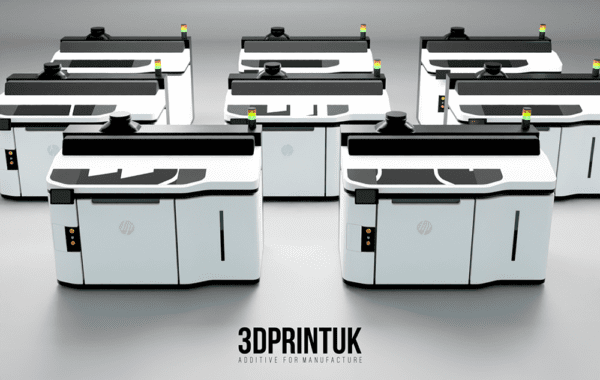
Arburg to Show Freeformer for First Time at MECSPE 2018
With twelve themed exhibitions, the international MECSPE trade fair to be held from 22 to 24 March 2018 in Parma, Italy, will offer an overview of all aspects of the manufacturing industry.
Arburg will be presenting the Freeformer and Arburg Plastic Freeforming (APF) as an example of “additive manufacturing” for the first time here, in hall 6, stand I33. The open additive production system is suitable for numerous industries and areas of application. As an example, implants made of medical grade polylactide (PLLA) produced using the APF process will be on view. Arburg will thus demonstrate the wide-ranging options for the industrial additive manufacturing of functional components made from qualified original materials.
In addition to the Freeformer itself, a selection of functional components will also be exhibited. Björn Noren, Managing Director of Arburg’s Italian subsidiary, has the following to say about the company’s presence at the fair:
“In Italy in particular, there is great interest in the digital transformation and Industry 4.0 due to the available funding opportunities. Hence, the target groups who are currently working in this area will find a partner who can offer them extensive technology and expertise from a single source in Arburg. In this context, the industrial additive manufacturing of prototypes, one-off parts and small-volume batches, as well as the enhancement of high-volume injection moulded parts are gaining in importance. This is precisely what we will be presenting at the MECSPE 2018 in the field of “additive manufacturing” from the point-of-view of a machine manufacturer.
“Our system combines geometry and material freedom, the use of certified standard granulate as in injection moulding and mould-free manufacture of near-production parts. Thanks to our extensive expertise in this area and our specialised managers in additive manufacturing (MAM), we enable our customers targeted entry into and development of additive manufacturing. Moreover, our Prototyping Center at our headquarters in Lossburg allows us to quickly respond to individual enquiries with samples made from a variety of qualified materials.”
Free-formed implants for the medical technology sector
The use of a continuously growing list of qualified standard granulates means that working with the Freeformer is extremely versatile. In the medical technology sector, for example, it can be used for the additive manufacturing of individually adapted implants and orthotics, as well as for models used in preparation for surgery. At the trade fair, additively manufactured customised implants for facial and cranial bones made from a PLLA granulate will be on show. Here, the material used is a polylactide (PLLA) that gradually dissolves inside the body and is therefore particularly suitable for this medical field. Individual adaptation on the Freeformer means free formability, and therefore precise tailoring to the particular use case, especially for cosmetic-surgical use.
Individualisation of high-volume parts
Above and beyond the additive manufacture of one-off parts and small batches, high-volume parts can also be enhanced and customer wishes incorporated directly in the value chain by combining additive manufacturing, injection moulding and Industry 4.0 technologies. Arburg is a pioneer with regard to Industry 4.0 and the fully automated production of customised high-volume parts as single-unit batches. The company’s range of services also includes central, transparent production planning, monitoring and quality documentation via the Arburg host computer system (ALS). The specialists from Arburg will be available to interested trade visitors to comprehensively any questions they may have in this context.
Industrial additive manufacturing of functional parts
Arburg also demonstrates that Arburg Plastic Freeforming (APF) is not only suitable for prototyping but also for the industrial additive manufacturing of functional components in particular. As a rule, there are no limits to the industries and fields of application that the open system can cater to. One great advantage of the Freeformer and the APF process is that the process, and therefore the manufacture of parts, can be adapted precisely to the requirements at hand. Freeformer users can qualify their own original material and match the freely programmable process parameters specifically to the application at hand. In addition to amorphous standard granulates such as ABS, PA and PC, the ever-expanding range of materials qualified by Arburg includes, for example, elastic TPE or aerospace industry-approved PC for the production of parts such as air ducts. The Freeformer currently boasts a unique selling proposition with the processing of original PP. It used the semi-crystalline material and the associated support material armat 12 to produce parts such as cable clips with delicate structures and click effect.
Additive processing of two components
The Freeformer is equipped with two discharge units as standard. This enables it to process an additional component in order to manufacture a part in different colours, with special tactile qualities, or as a hard/soft combination, for example. In order to implement complex geometries, support structures can be used as the second component. Different water and alkali-soluble materials are used for this purpose. In developing new support materials for the Freeformer, Arburg collaborates with universities and established material partners. The water-soluble support material Armat 12 has been specially designed for processing PP. Moreover, the water-soluble support material Armat 11 has been further improved. With Armat 21, an alkaline-soluble alternative is also available.
ARBURG
+44 (0) 19 26 45 70 00
Website
Email






